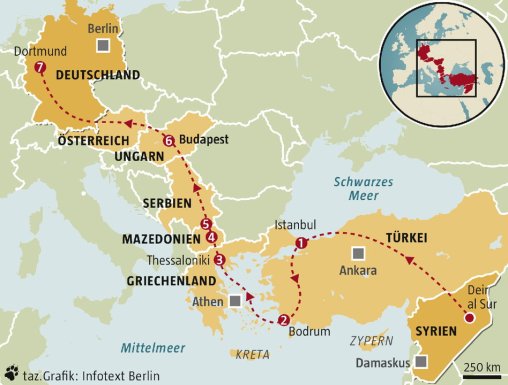By Brian Casey McDermott

Taz.de
1 Introduction
This paper was written for the course entitled: Der Jakobsweg als transkultureller Raum. Galicien am Ende des Pilgerweges at the Ruprecht-Karls-Universität Heidelberg in Heidelberg, Germany. The famous Christian pilgrimage trail, The Way of Saint James, with its many routes throughout Europe which eventually come together to form some of the main trails which lead to Galicia’s capital, Santiago de Compostela, (in the northwestern part of Spain) is said to be where the remains of Saint James are buried. The history of this pilgrimage trail and its destination in Galicia were used as some of the main themes of the course as great examples of being historically rich transcultural spaces. This current paper will first focus on an essay that was used as a basis of the course written by the German philosopher Wolfgang Welsch specifically about transculturality entitled: “Transculturality – the Puzzling Form of Cultures Today” after which the themes from his essay will be brought in connection with the current situation with the influx of refugees that arrived in Germany in the year 2015. In his essay Welsch describes the concept of transculturality which, according to him, is the most appropriate conception for defining cultures today. In order to portray his ideas he opposes the traditional concept of single cultures and even the more recent concepts of interculturality and multiculturality. There are many countries and places that could be explored and talked about in connection with this very large topic but this short and global paper’s focus will mainly be on Germany and its current situation in regards to the concept of transculturality. In the following paper the term “refugee” along with the definition of “society” in general will be given in order to give clarity to what will be discussed in the content of this paper.
The term “refugee” must be established so that the topics and themes of this paper are clear. According to the Miriam-Webster’s dictionary a refugee is understood as:
“One that flees; especially: a person who flees to a foreign country or power to escape danger or persecution.” (Meriam-Weberst’s Dictionary: 2015: Web)
As mentioned in the dictionary a refugee is anyone who is getting away from their native country to escape persecution and most specifically someone who is fleeing to escape a situation when their life is at risk.
The term society will also be given in order to show what the perspective of this paper is in regards to this topic. According to the Miriam Webster’s dictionary a society can be understood as:
“An enduring and cooperating social group whose members have developed organized patterns of relationships through interaction with one another.” (Meriam-Weberst’s Dictionary: 2015: Web)
The University of Cambridge, further, gives the definition for a society as:
“A large group of people who live together in an organized way, making decisions about how to do things and sharing the work that needs to be done. All the people in a country, or in several similar countries, can be referred to as a society.” (The University of Cambridge Dictionary: 2015: Web)
Now that the some of the main definitions of the terms that will be discussed in this paper have been given and the basic idea and structure of the paper have been laid out the central ideas and concepts given by Welsch will be discussed.
Contents
1 Introduction
2 Traditional Concept of Single Cultures
2.1 Welsch’s Critique of The Traditional Concept of Single Cultures
3 Interculturality and Multiculturality
3.1 Interculturality and Welsch’s Critique
3.2 Multiculturality and Welsch’s Critique
Pingback: Transculturality and the Refugees in Germany (VII) | Galicien Zentrum der Universität Heidelberg
Pingback: Transculturality and the Refugees in Germany (V) | Galicien Zentrum der Universität Heidelberg
Pingback: Transculturality and the Refugees in Germany (VI) | Galicien Zentrum der Universität Heidelberg